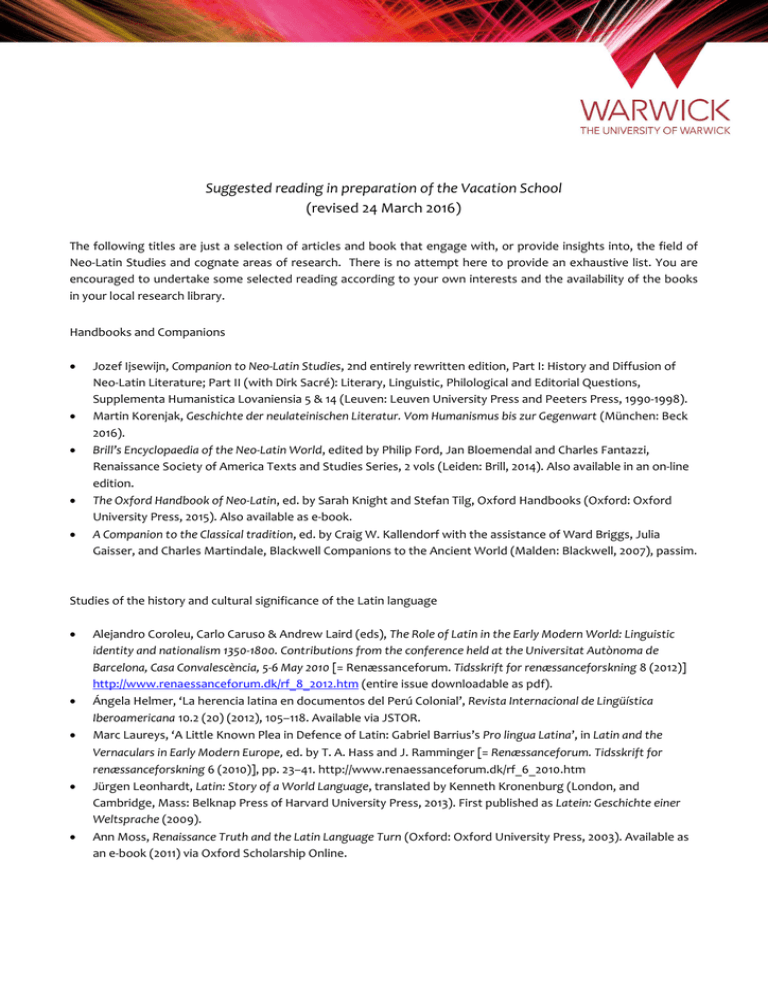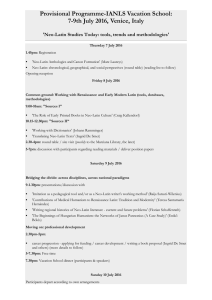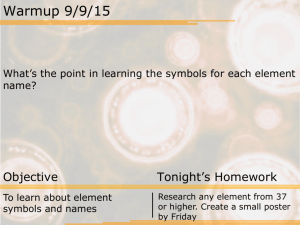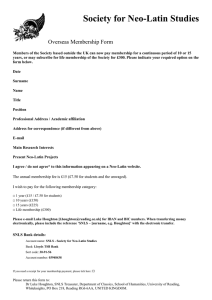Suggested reading in preparation of the Vacation School
advertisement

Suggested reading in preparation of the Vacation School (revised 24 March 2016) The following titles are just a selection of articles and book that engage with, or provide insights into, the field of Neo-Latin Studies and cognate areas of research. There is no attempt here to provide an exhaustive list. You are encouraged to undertake some selected reading according to your own interests and the availability of the books in your local research library. Handbooks and Companions Jozef Ijsewijn, Companion to Neo-Latin Studies, 2nd entirely rewritten edition, Part I: History and Diffusion of Neo-Latin Literature; Part II (with Dirk Sacré): Literary, Linguistic, Philological and Editorial Questions, Supplementa Humanistica Lovaniensia 5 & 14 (Leuven: Leuven University Press and Peeters Press, 1990-1998). Martin Korenjak, Geschichte der neulateinischen Literatur. Vom Humanismus bis zur Gegenwart (München: Beck 2016). Brill’s Encyclopaedia of the Neo-Latin World, edited by Philip Ford, Jan Bloemendal and Charles Fantazzi, Renaissance Society of America Texts and Studies Series, 2 vols (Leiden: Brill, 2014). Also available in an on-line edition. The Oxford Handbook of Neo-Latin, ed. by Sarah Knight and Stefan Tilg, Oxford Handbooks (Oxford: Oxford University Press, 2015). Also available as e-book. A Companion to the Classical tradition, ed. by Craig W. Kallendorf with the assistance of Ward Briggs, Julia Gaisser, and Charles Martindale, Blackwell Companions to the Ancient World (Malden: Blackwell, 2007), passim. Studies of the history and cultural significance of the Latin language Alejandro Coroleu, Carlo Caruso & Andrew Laird (eds), The Role of Latin in the Early Modern World: Linguistic identity and nationalism 1350-1800. Contributions from the conference held at the Universitat Autònoma de Barcelona, Casa Convalescència, 5-6 May 2010 [= Renæssanceforum. Tidsskrift for renæssanceforskning 8 (2012)] http://www.renaessanceforum.dk/rf_8_2012.htm (entire issue downloadable as pdf). Ángela Helmer, ‘La herencia latina en documentos del Perú Colonial’, Revista Internacional de Lingüística Iberoamericana 10.2 (20) (2012), 105–118. Available via JSTOR. Marc Laureys, ‘A Little Known Plea in Defence of Latin: Gabriel Barrius’s Pro lingua Latina’, in Latin and the Vernaculars in Early Modern Europe, ed. by T. A. Hass and J. Ramminger [= Renæssanceforum. Tidsskrift for renæssanceforskning 6 (2010)], pp. 23–41. http://www.renaessanceforum.dk/rf_6_2010.htm Jürgen Leonhardt, Latin: Story of a World Language, translated by Kenneth Kronenburg (London, and Cambridge, Mass: Belknap Press of Harvard University Press, 2013). First published as Latein: Geschichte einer Weltsprache (2009). Ann Moss, Renaissance Truth and the Latin Language Turn (Oxford: Oxford University Press, 2003). Available as an e-book (2011) via Oxford Scholarship Online. 1 2 Nicholas Ostler, Ad Infinitum. A Biography of Latin and the World it Created (London: HarperPress, 2007, repr. 2009). Silvia Rizzo, Ricerche sul latino umanistico (Rome: Edizioni di storia e letteratura, 2002). Jane Stevenson, Women Latin Poets: Language, Gender and Authority from Antiquity to the Eighteenth Century (Oxford: Oxford University Press, 2005). Peter Stotz, Handbuch zur lateinischen Sprache des Mittelalters, Handbuch der Altertumswissenschaft 2 Abt., Teil 5, 1. Bd. (München: Beck, 2002). Wilfried Stroh, Latein ist tot, es lebe Latein! Kleine Geschichte einer großen Sprache (Berlin: List 2007, several reprints) – French translation: Le Latin est mort, vive le latin! Petite histoire d'une grande langue, trans. by Sylvain Bluntz (Paris: Les Belles Lettres, 2008). Françoise Waquet, Latin, or the Empire of a Sign from the sixteenth to the twentieth centuries, translated by John Howe (London and New York: Verso, 2001). First published as Le Latin, ou l’empire d’un signe (1998). Methodological reflections on the field (see also handbooks/companions above) Ingrid A. R. De Smet, ‘Not for Classicists? The State of Neo-Latin Studies’ [review article], Journal of Roman Studies 89 (1999), 205-209 Hans Helander, ‘Neo-Latin Studies: Significance and Prospects’, Symbolae Osloenses 76 (2001), 5–102. Available as a pdf via Taylor & Francis Online (institutional or private subscription required). Toon Van Hal, ‘Towards Meta-Neo-Latin Studies? Impetus to Debate on the Field of Neo-Latin Studies and its Methodology’, Humanistica Lovaniensia 56 (2007), 349–365. Available online via JSTOR. Ingrid De Smet Lic PG dip KU Leuven PhD Camb DLitt Warwick FBA Professor of French and Neo-Latin Studies (School of Modern Languages & Cultures) Director, Centre for the Study of the Renaisance





